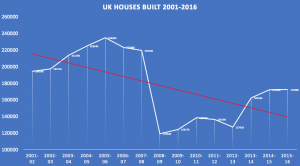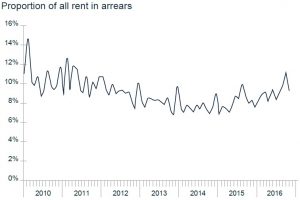2017 and beyond…
2017 and beyond is set to offer a minefield of external challenges for the lettings industry: further regulation; increased taxation upon landlords; less tax incentives for landlords; impending abolishment of agent fees and dare we forget; uncertainty surrounding brexit.
Letting agents will be ‘price takers’ NOT ‘price makers’…
Couple the aforementioned challenges with the fact there’s been no notable increase in private rented sector housing supply, then it’s inevitable rents will rise. However, the market forces of supply and demand will show that it’s not simply a case of passing increased costs onto rents, as we explore in this article.

^ House building permanent dwellings started, by tenure in the UK (gov.uk).
The government commissioned ‘Barker Review‘ of UK housing supply in the UK identified the need for 250,000 houses to be built each year from 2004. The graph above clearly shows, the closest we got to those figures was in 2005. Despite an upward trend in recent years, house building levels have some serious catching-up to do. Of course, that takes time and won’t happen overnight.
Wage growth forecasted to be slower than rent rises…
Research suggests that wage growth will rise at around 2.2% in the UK in the first three quarters of 2017. In contrast, rents are set to rise by 2.5% during 2017 and according to the same report by Savills, as much as 19% by 2021. Over time, rent arrears are likely to ensue if real wages don’t increase accordingly. As reported by the BBC, only Greece has suffered a bigger fall in real wages than the UK across all OECD countries (between 2007 and 2015).
Tenants vulnerable to rent arrears…
This demonstrates how vulnerable tenants will be if rental increases continue to outstrip wage growth. Trends suggest that such vulnerability will start to become a biting reality in 2017 with insights from the Your Move index showing 9.3% of all tenancies experienced arrears of a day or more in October 2016 with a clear upward trend since early 2014.

The above is perhaps compounded by the fact tenants pay up to 47% of their net income in rent. Therefore, it’s not simply a case of increasing rents to fill the void. After all, profitability is determined by the market price that an agent can charge, compared to the cost of supplying it. Put simply, tenants can only pay what they can afford. Agents will only stay in business if they can make a profit.
Profitability considerations…
Failure to respond to threats and seize opportunities could make life extremely difficult for letting agents this year. One thing is for sure, competition will be fierce. Here’s some suggested areas of consideration:
Slash costs without compromising service levels
- Re-assess borrowing. Finance that is due to expire could provide the opportunity to reduce monthly payments, or take advantage of a better rate.
- Set budgets, monitor them closely and be prepared to switch providers if they can save money or make your agency more efficient. From utilities, Wi-Fi, insurance, stationary, marketing and postage – there’s often savings to be made.
- Go paperless where possible, without losing the personal touch. Paperless inventories for example: Each colour page printed with an inventory can cost between 2.7 and 5p (for the ink/laser cartridge alone). 10 inventories per month at 60 pages (2 copies) equates to 1200 pages, per year that’s 14,400 pages = £388.80 or £720 per year (depending on how efficient your printer is). This is before printer maintenance and staff time is considered. Inventory Hive’s paperless approval process allows tenant signatures and feedback to be captured remotely from a laptop, desktop or mobile device.
Differentiate by service and price to improve portfolio
- Conducting surveys to understand what landlords and tenants value (and what they don’t) can provide invaluable understanding when determining service and price levels. Areas to focus on might include: personal service; staff continuity; setting realistic deliverables (do what you say you’re going to do).
- Consider performance related incentives with staff, or recognition of achievements outside the pay structure.
Add value at no extra cost
- Passing on discounts to landlords from suppliers, or equipping them with informative guides and information are a great way to build trusting and loyal relationships without hitting your bottom line.
